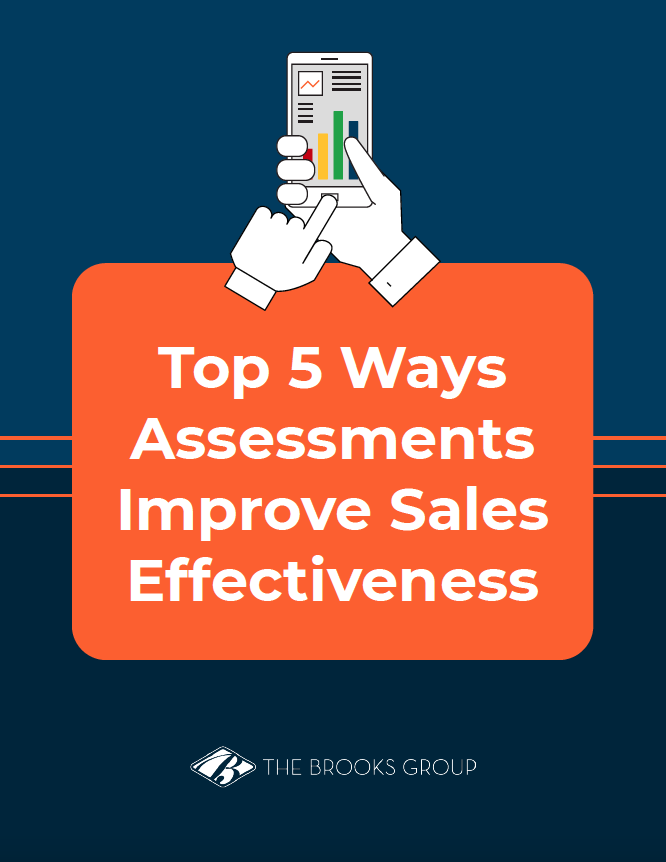As a sales leader, there’s a lot riding on your hiring decisions. You know good hiring practices do far more than simply evaluate an applicant’s selling skills—they give you the insight to hire great salespeople.
No doubt you’ve learned the hard way that, when you lose a sales professional, it can cost you as much as 150% of their annual salary and benefits, plus lost sales and missed opportunities.
Odds are, you didn’t let your last employee go because they lacked the skills to do the job; it may have been for a lack of personal skills or a mismatch with your organization. This common situation has led to the maxim, “Hire for attitude, train for skill.”
While most sales managers believe in the importance of “attitude,” they often ignore it during the screening process. They want someone up and running quickly, don’t have time to train, and often choose someone with a solid track record from a competitor.
Most sales professionals are hired based on their prior work experience with a specific industry, market, or product line. The hiring manager assumes that the individual’s past work experience was positive, and that the person is available because of circumstances over which they had no control, rather than because of average or below-average performance.
This certainly doesn’t guarantee the individual has the drive to succeed and the right attitude to reach sales targets in a new position—or that they’re the right fit for your organization.
The Importance of Identifying Attitude
You can think of attitude as showing your “true colors”—personal qualities that are always present but most observable when the going gets tough, such as accountability, resilience, results orientation, and work ethic.
Knowing that experience and job skills aren’t the whole story, many well-intentioned sales managers use a comprehensive interview process and a personality test to try to get more insight.
But they still don’t get all the information they need to hire a great salesperson. Candidates are at their best during interviews. Most common hiring tests stop short and don’t reveal individual strengths, acumen, competencies, or what makes them tick.
Wanting to do something, doing it, and doing it well are three very different things. In thousands of cases over the years, we’ve worked with sales professionals who were qualified to do their jobs and wanted to do them but simply didn’t have the skills to perform at a high level. Being able to identify that missing piece is how you can hire great sales talent.
Assessing Personal Skills and Competencies
Hiring assessments such as our Brooks Talent Index™ reveal that personal skills and competencies are the most significant difference between those who perform well and those who don’t. Well-developed personal skills—another name for “attitude”—enable you to clearly see the tasks and abilities your job requires and focus on them.
For example, sales jobs typically require results orientation and resilience. You could be very intelligent, but not naturally focused on results or able to rebound from setbacks quickly. In that case, you won’t succeed in sales even with deep industry experience, people skills, and the desire to be a good sales professional.
It’s a frustrating paradox of traditional hiring methods. Attitude can make or break a new hire’s chance of success. But it’s frequently overlooked in the selection process. When someone is fired (or just doesn’t work out) it’s almost always because they don’t have the specific personal skills required to do the job well.
How to Separate Great Sales Candidates from the Rest
How can you uncover the right information about a candidate’s attitude during the screening and selection process?
Let’s say previous sellers have failed to thrive within your organization’s high-pressure sales environment. You’d like to find a new sales professional who has the resiliency (personal skill = attitude) to survive and succeed
One simple approach is simply to ask each applicant questions related to the required attitudes for a sales role at your organization and back that up with a validated skills competency assessment.
For example: To find out how resilient they are, ask them to describe a time they faced rejection or failure but made it through the experience. See how they describe the situation and what they learned from it. You’ll be amazed how easy it is to separate those who are resilient from those who aren’t.
To discover how results-oriented they are, ask them about a time they didn’t achieve the results they needed to achieve. You don’t want someone who claims never to have missed a target or botched a sale. You want someone who takes responsibility for achieving results. Look for a candidate who can describe where they underperformed and what they learned from the experience.
If you take the time to analyze what skills and capabilities are essential to the position you’re hiring for, you can craft questions that help you separate strong candidates from those that aren’t the right fit.
How to Keep Great Sales Professionals Once You Hire Them
Many sales organizations come to us for help because they’re facing turnover of close to 50%—both voluntary and involuntary. No matter what market conditions are like, it’s all too common to lose your best performers to the competition or to hire someone who’s been a superstar for a competitor but can’t seem to get results for your company.
We all know that the right people in the right places doing the right things can achieve truly amazing results. But how do you find and keep the sales superstars and guide them toward success at your company?
The first step is to hire wisely. One of the best ways to achieve much-needed consistency and strong sales results is evaluating sales professionals’ driving forces and behavior style as part of the interview process, as described above. Assessing candidates before hiring can improve hiring success rates, ongoing performance, and retention.
Once you’ve hired a top performer, you want to keep them engaged and committed to achieving great results for your organization. After evaluating thousands of sales professionals, we’ve uncovered a surprising fact about what motivates top-performing sellers: Money doesn’t always top the list.
6 Motivators of Great Salespeople
In most cases, sales professionals are well compensated for their performance, often drawing mid-six-figure salaries. However, they want more than just a good paycheck.
Here are six motivators of high-performing sales professionals.
- Recognition as top performers
- A clearly defined career path with a specific timeline and measurable milestones
- Opportunities to achieve and perform at the top of their game
- Ongoing sales coaching and ways to learn and grow their skills
- Being a subject-matter expert on the industry, market, and competition
- Sales managers who are attentive, understanding, knowledgeable, and willing to coach
It boils down to this: Top performers know they’re top performers and they want to stay that way. They want opportunities to achieve, develop their sales skills, and get recognition for their record of results. And they’re smart enough to demand strong sales coaching, mentoring, and excellent guidance along the way.
Sales training is one of the best ways to increase top performers’ job satisfaction and retention rates by providing them with a way to advance their skills and expertise. By investing in sales training and developing an effective sales force, organizations can retain their top performers, drive revenue growth, improve customer relationships, and gain a competitive advantage—ultimately contributing to a stronger bottom line.
Successful sales leaders will reap long-term benefits from offering a comprehensive program of sales training, sales coaching, and reinforcement for both top sales professionals and emerging sales talent.
Find out how The Brooks Group sales training and hiring assessments help sales leaders hire and keep great salespeople.
White Paper Download
Top 5 Ways Assessments Improve Sales Effectiveness
Assessments are a powerful tool sales leaders can use to understand to hire smarter, coach effectively, retain top performers and ultimately improve sales effectiveness and performance. This guide outlines the top 5 ways you can use assessments to improve sales effectiveness.





